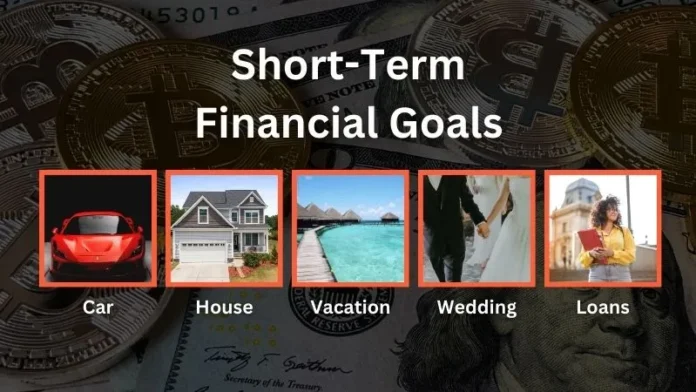Table of Contents
Short-term financial goals are the first step in gaining financial security. If you want to achieve something in a short span, like buying a car or a house, it would not be good enough to rely on hope. You need to do something, like save money or make a budget, which could maximize the chance of achieving the goal.
In this blog, you’ll learn about short-term savings goals and the importance of setting them.
Also, before getting into more details check out what are financial goals and their type to set your goals for different stages.
What are Short-Term Financial Goals?
Short-term financial goals last less than a year or month. These goals describe more immediate plans and go beyond covering the basics, depending upon the timeline. Short-term financial goals are more accessible to achieve.
They can pay off debts, save for traveling and weddings, make minor home repairs, or create an emergency fund.
Why is it Important to Set Short-Term Goals?
Short-term goals are aimed you can achieving quickly, typically within months or weeks. Setting or working on short-term savings goals helps you:
- Bring long-term vision
- Offer a blueprint for success
- It helps to stay motivated and focused
- Make you realize what you can achieve
- Get started quickly
- Define deadlines
- Prioritize and manage tasks
- Get quick feedback
- Provide a foundation for projects or tasks
- Boost confidence
11 Short-Term Financial Goals and How to Achieve it?
1. Saving for a Vacation or Wedding
Saving for a dream vacation, honeymoon, or wedding can be divided into monthly sections. Before planning a vacation or wedding, think of all the costs and expenses that it can incur. It is usually a good idea to estimate the cost of any trip or occasion before planning it to save your dollars.
2. Buy a Car or House
Are you planning to buy a new car or a house? Putting more money down when making a purchase can lower the amount of a car or house loan. A down payment on a car or house is a good short-term financial goal for those looking to buy a new vehicle for themselves. Decide your total budget for the car or a house, and consider getting pre-approved for a loan to know how much you need to save for a down payment.
3. Pay Off Student Loans
Student loans are a major burden on the monthly budget of most of the individuals. Saying goodbye or lowering those payments can free up your cash and make it easier to save your money and meet your other short-term financial goals.
You can pay off your student loans by refinancing into a new loan by opting for a lower interest rate. But, if you refinance federal student loans with the help of a private lender, you may not get some of the associated benefits, like deferment, income-based repayment, and forbearance, which can be beneficial in your tough times.
4. Create an Emergency Fund
The primary purpose of creating an emergency fund is to offer a cash buffer you can use later for any unexpected or emergency expenses, like a major car repair or a job loss.
Depending on your living expenses, it could take around six months to one year to save up for a good emergency fund that supports you. So start with a small aim to save dollars and divide your goal into different sections.
5. Put Money Into Health Savings
An (HSA) is an excellent investment for short-term goals. A health savings account can save funds for healthcare expenses, like suffering from any disease.
You can even think of an HSA as an alternative to emergency funds, especially for healthcare emergencies. Most employers even contribute funds to the employee HSAs, which is a good option.
You will find here the best HSA providers of 2024.
6. Start an Investment Fund
Investment for short-term goals helps you create long-term wealth via MF, stocks, and other investment options. However, it can take longer to see high returns on investments, so getting started with an investment fund can be a good short-term goal.
Many investment companies like Vanguard and J.P. Morgan allow you to open an investment account and start investing with them. These companies also enable you to open an online account within minutes.
7. Start a Side Hustle
Starting a side hustle can aid in paying off debt and student loans faster to reach your financial goals. A new income allows you to do more online shopping than planned.
You can use the side hustle money in your small spending. For this, you need to make a plan in place and then carefully execute it to bring the best out of your income. You can start with a babysitting job, dog sitting, dog walking, blogging, starting a YouTube channel or a podcast, etc.
8. Manage Your Subscriptions
Paying unnecessarily for a high subscription package can negatively impact your savings account. To eliminate unnecessary and high subscription plans, check your bank plus credit card statements to see what monthly subscriptions are burning your pockets.
Consequently, if you’re not watching that streaming service, reading that newspaper, or cooking those meal prep deliveries, it might be the right time to cancel one or more subscriptions.
9. Pay Off Credit Card Debt
Paying off credit card debt is among the other short-term financial goals. The interest earned on credit card debt can be more expensive, it can make achieving your short-term goals more challenging.
Consider the avalanche method for paying off credit card debt, which includes paying the lowest on all your highest-rate debt. Another one is the snowball method, which involves paying the lowest on all cards but leverages an extra amount to pay off debt with the smallest balance.
10. Improve Your Credit Score
A good credit score can impact several areas of your life and help you meet financial goals. This includes your ability to buy a car or house, auto loans, job opportunities, mortgages, and more. So, if you maintain a good credit score, you’ll pay off your debt in the future.
You can increase your credit score by paying bills on time. You can even contact a credit card company and ask them to increase the credit, which will only take a few minutes as a good credit score will save your money on interest payments and leverage savings for further investments.
11. Learn More About Personal Finance
Gaining knowledge about personal finance will never harm you in any sense. It’s a good move to learn about personal finance as it helps individuals manage their finances by budgeting, spending monetary resources, and saving.
Reading personal finance books can help you a lot to learn about various investment strategies, some basic financial terms, retirement plans, etc., to come one step closer to achieving your dream financial goals.
What Else?
With increasing spending patterns, it becomes important for you to cover the basics and meet short-term financial goals rather than directly pursuing long-term goals.
Short-term goals include setting a budget, paying off debt, and starting an emergency fund. You can update and review your goals by monitoring your progress monthly. Your little effort (savings and investments for short-term goals) could light up your life and fill you with joy. Contact a financial advisor today and get assistance that works best for you.



